With the ongoing humanitarian crisis in Palestine, I wish to dedicate this forward to the charities helping support those suffering under such painful occupation and oppression. Please consider donating to the UNRWA or WAQFOREVER to help the vital aid for Palestinians continue.
I rarely find myself using the word ‘rockstar’ to describe musicians, but Manatsu Nagahara is an artist whose presence is so much larger than life that I can’t think of a more befitting title.
Discographies, to me, are tapestries woven by musicians, and my focus is always on the work they share with the world: the gently-woven threads comprising the most colourful of works. I covet the transparency of her identity in her art: I can’t pinpoint a single other voice like her’s that can make hearts tremble in awe just from the volume and radiance of happiness it shouts into the world. Like so many other important moments in my life, a fateful encounter with just one song, ‘Yeah!’ by her band Sebastian X, shook its words, singing, and sounds into my perception of those summer days, to ring in my memory forevermore.
The legacy of her work casts a shadow as grand as that of her identity: encompassing different eras and cultural cosms, sheltering innumerable listeners with every step she’s made along her journey, with myself as one of them, hence my joy and honour to have had the opportunity to speak to her for this interview!
An Interview with Manatsu Nagahara
-
1.
Mustafa: “Hello Ms Nagahara!! How’s your day been, how’ve you been in general?”
Manatsu Nagahara: “It’s been raining a lot in Tokyo lately, but today it’s finally cleared up, so my emotions and feelings are really great!”
Mustafa: “I’m happy to hear that! I imagine it’s really early for you over there in the afternoon. It’s 5am here, so I’ve been awake all night preparing for this interview!”
Manatsu Nagahara: “*laughs* Oh thank you!!”
Mustafa: “Congratulations on your recent release of ‘Musicalium’ from Otosata! I really like how different the album is from the music you’ve released before. What has it been like since the album released? How have your fans responded to the music, and what’s it been like going on the tour for the album?”
Manatsu Nagahara: “The tour started last year after the album’s release in September, so it’s been a 4-5 month long tour which ended last month. We’re taking a little break, a short breathing moment for us.
One of the themes of ‘Musicalium’ is the therapy and healing power of music. We wanted it to be therapeutic to hear. We chose this theme because I was visiting the hospital (for some issues) last year, so we wished for this album to be listened to whenever you feel sick or unwell: a therapy for everyone, including the female audience whenever they experience hormone imbalances, so that the music can help them through this time. After the tour we even heard from some fans who had mental health difficulties or chronic health difficulties, about how they felt really happy with the album and that it’s worked as a therapy for them, which we were really honoured to hear!”
Mustafa: “I’m sorry to hear of the challenges you were facing last year with your health! I think it’s really amazing how you were able to transform that experience into inspiration for wanting to make music that’s therapy for your listeners. I haven’t often heard of music being made as medicinal therapy, so I’m interested in your perspective on music being used therapeutically: have you encountered this idea before, or do you feel like you’ve tapped into something quite new?”
Manatsu Nagahara: “When creating ‘Musicalium’, we were doing a lot of trail and error in our recording sessions with the arrangements of the songs. We listen to the arrangement and judge if it’s relaxing or too intense. During this process we were measuring the music through our bodies: how our bodies reacted to the sounds, which is how the album was constructed for the purpose of being therapeutic. I’d been listening to therapeutic music myself as well, one of which was ‘Mother Earth’s Plantasia’ by Mort Garson. One of the key phrases for this album is that it’s “music for plants to listen to”. Though it’s electronic music, it’s really soothing and the opposite of intense feeling. I listened to this album a lot and found it to be really therapeutic for myself!”
Mustafa: “That reminds me of the name ’Musicalium’. When I first saw it, it made me think of music in its most base form, it sounds like the name of an element, but now after hearing your story, am I right to think ‘Musicalium’ is named as what you would consider to be the medical nature of music?”
Manatsu Nagahara: “It actually relates more to the ideas of ‘Aquarium’, or ‘Planetarium’, like a box or safe place for the audience to be in and something that protects them, so that the listener can feel free within that protected place of music. That’s what we want for the album to be!”
Mustafa: “Oh I see!!
The healing side of the album also reminds me of the music video you made for ‘Beautiful Forest’, where in the video you have a friendly monster who’s been injured who you end up taking care of and healing. Not only do I find the song really sweet, but it made me very emotional watching it as well. It’s very different from the music videos of the earlier music you’ve made, and I wanted to express appreciation for that song and video in particular!”
Manatsu Nagahara: “Thank you very much!! The director of the music video was inspired by the song itself, and made the whole story of the music video, so I myself really liked seeing the story too!”
Mustafa: “I noticed that the last performance you did for the ‘Musicalium’ tour was held in a church, and I found that really really interesting because I haven’t really heard of musicians performing in churches in Japan before. I see that place as linking in strongly to the album’s healing nature through the spiritual aspect of a church. What does spirituality mean to you, and is it related to you decision to perform the final show at the church?”
Manatsu Nagahara: “Churches in Japan, though it is rare, are sometimes used as music venues, and the church is likely to be designed with good acoustics in mind. A church is a place where people gather, as well as the wishes they all have, and their emotions and feelings, they all gather in that one place, which is why we wanted to perform there on the tour.
I’m really drawn to the spiritual side of everyday prayer, life, and habits. Even though Japanese people aren’t said to have a specific religion to believe in, there are some daily prayers like wishing for peoples health, or when we visit a shrine we’d perform a prayer, to me those acts are really strongly tied to our daily lives, and it has a connection with our physical and mental states, so it’s one of the important pieces of the music that I make!”
Mustafa: “Would you say from the start, when you first formed SEBASTIAN X in 2008, that spirituality had a big role in your music? The kind of music SEBASTIAN X was making was very different to what Otosata makes, so I’m curious if there is a distinction between the two groups in that regard!”
Manatsu Nagahara: “Yes, it’s been part of myself and my music since the beginning!”
-
2.
Mustafa: “Otosata is formed of you and your bandmate Ari. I’m very interested in your connection to Ari, because she was there when SEBASTIAN X first formed, and even with your solo music she’s helped with performances, so it seems clear that you’re both really really close! What story do you both share, and what is it like working together?”
Manatsu Nagahara: “We met when I was in my first year of high school, when I was 16! In the beginning, I wanted to form a band so I was looking for a classmate who likes music to work with. At first we were together for the music, but now it feels much more like family! I believe that the relationship with people you’re in a band with ends up showing in the music made and performed together. When performing live, we do shopping or have some tea beforehand, and even when we’re not making music we spend a lot of time together, and we travel together too! It feels like we’re family now!”
Mustafa: “I’ve noticed that the connection you share with Ari must be special as seen in your music, and with how
I remember when I first noticed her present in both SEBASTIAN X and then your solo performances afterwards, and it must be amazing to have a connection that’s lasted for so long!”
Manatsu Nagahara: “Thank you!!”
-
3.
Mustafa: “SEBASTIAN X has been a very big part of your life and career, and musically the group was really big and influential. How did SEBASTIAN X end up coming together with Yutaka and Ryota? From what I’ve read in interviews, and from what I’ve seen and heard of the group, you all share a very special connection, so how did it form in the first place?”
Manatsu Nagahara: “I might be missing some details, it was many years ago, but it was formed from a community of music fans in the local town. Myself and Ari were part of the community, and many bands were formed from within there. SEBASTIAN X was formed when I was 20 as a guitar-less band, but around 3 years prior we’d formed a traditional group with drums, bass, keyboard, and guitar. However when the guitarist left the band, we decided to form a guitar-less trio/band, which became known as SEBASTIAN X. At this point, we all already knew eachother, we’d been making music together for 3 or 4 years, even as a cover band at one point.”
Mustafa: “The absence of a guitar really stood out to me when I discovered SEBASTIAN X, particularly how this absence was specifically mentioned in the band’s biography. With the guitar being such a staple for bands everywhere, what was the specific intention behind the conscious decision to keep the guitar out of SEBASTIAN X when your guitarist left?”
Manatsu Nagahara: “One of the reasons we stayed guitar-less was because we couldn’t exactly pinpoint what kind of guitarist we wanted in the band. Thinking of rock bands, it might be a very unusual thing to have absent, but thinking of jazz bands or other genres, a guitar-less formation isn’t really uncommon, so we thought we could learn from these other kinds of bands. We didn’t really think about it too hard, we just went along with it!”
Mustafa: “With that array of inspirations, after all these years of SEBASTIAN X, how do you define the group? Is there a specific group it can belong to, or does it not really belong to any one label?”
Manatsu Nagahara: “Though we were in scene with bands of the same age as us, we were musically distinct from the others. One of the reasons I think this is, while we’d formed as a pop band, the first style of music we were drawn to was punk, so in the spirit of punk we’ve done many things, like plugging the bass into both bass and guitar amps, or having our keyboard run into overdrive effect. We were creating our own kind of sound, in the spirit of punk rather than creating for the sake of being experimental. Even now in retrospect, we still believe SEBASTIAN X is a completely unique band in this regard.”
Mustafa: “When I first heard SEBASTIAN X, it was the song ‘Yeah!’, I was really really blown away by that sound as I’d not heard something exactly like it, and to this day ‘Yeah!’ is one of my absolute songs from SEBASTIAN X, and the cover for its EP is one of my favourites for any music release, I truly love it so much!”
Manatsu Nagahara: “*Gasps at mention of ‘Yeah!’* Thank you!!”
On a sullen summer night in 2021, in between the rejoicing of lengthy Sonic Heroes marathons, did I come across SEBASTIAN X’s ‘Yeah!’. Its defiant playfulness lit my room up, and I found myself replaying the song over and over, mesmerised by the sequence of the music video’s title card drop being followed by the segment of Mantasu Nagahara eating spaghetti to the backing of the bass and keys’ roars.
Mustafa: “In the past you’ve described SEBASTIAN X as a group that operated through its members often disagreeing. I’m interested in that model of creating music, building upon disagreements with compromises, and how the result would be something special due to being made from the overlaps where disagreeing members could decide on something together. How do you feel about that as a model for making music, and do you feel like it was a sustainable way of making music?”
Manatsu Nagahara: “When creating music in this way, our personal philosophies and aesthetics would be tested a lot of the time because when members disagreed, we’d ask ourselves why we like/prefer things so specifically, what can be changed, what cannot be changed, and our personal preferences would be sharpened and strengthened by this process. In this aspect, those interactions were really creative and productive. Also, we were young during the start of SEBASTIAN X, we didn’t really know how the world or society worked, so during that time we had a lot of deep and interesting interactions through music that made us grow, not only musically but also as people. As teenagers and in our early 20s, we really didn’t know many things like how to work as a group, but having those interactions with eachother really made us learn a lot about ourselves. Even though I think that there were some disagreements that could have been avoided if we had more knowledge and maturity, at the same time those relationships really helped us grow, and I think that in itself is creative and productive.”
Mustafa: “I think that really shines through in the music of SEBASTIAN X, and I’m really grateful that SEBASTIAN X was able to exist in a way that made music in such a unique and inspiring way!”
Manatsu Nagahara: “Thank you!!”
Mustafa: “Has that dynamic continued with your ongoing partnership with Ari, or is it different when it’s just you two working together?”
Manatsu Nagahara: “It changed gradually! When doing SEBASTIAN X, the only form of communication we were familiar with was how the band members spoke to eachother: we had to supplement our musical expressions with our own words. But now having worked with many other musicians, it feels like I can communicate with other musicians despite any differences in life paths we’ve taken or music genres we have as backgrounds. It feels like now we can communicate with eachother within the music, and understand how eachother is feeling and why. Now it feels like we can have all of those interactions of communication in the music itself.”
-
4.
Mustafa: “Obviously SEBASTIAN X ended up becoming really really big, and the band went on hiatus at one point as well. How do you perceive the legacy of SEBASTIAN X, what it’s come to represent, and its status in the music scene?”
MN: “SEBASTIAN X was our seishun (youth), and we were the generation that was in the transition between the analog and internet generations. The YouTube/SNS were available at the time, but at the same time we were taught a lot of the culture and traditions from the analog, offline era. It feels like the band has a lot of fun elements from that specific, inbetween, transitional generation.”
Mustafa: “Your answer is really enlightening because I hadn’t really considered it in that way before, but it reminds me of when I first saw the music video for ‘GO BACK TO MONSTER’, which is one of my favourite SEBASTIAN X songs, it did feel like a time-capsule that captured the style and the mannerisms of songs and music videos from earlier generations, it didn’t feel like it was from a fully, newer Digital era. I was really surprised because the recording quality of the music video was really really high, much higher than what would be expected from a video released during that time, but I thought that the way it was put together was so unique and it felt like looking into the past in a way. I just love that song so, so much!
There’s one lyric in the song which has really really stuck with me and inspired me so much, “Kimi no me ni utsuru no wa kagayaku sekaidesu kaaa?” (“Is it a sparkling world that’s reflected in your eyes?”), I love it so much, it’s such a beautiful, beautiful lyric! Ever since I heard it, not only did it make me fall in love with SEBASTIAN X, but also the imagery of a shining world seen through your eyes really gave me an insight into your imagination and artistic vision, and ever since then I’ve been completely fascinated by your music!”
Manatsu Nagahara: “I’m so so happy to hear that, thank you so much, truly!”Mustafa: “Before changing topic: can you remember much of the actual recording of the video for Go Back to Monster?”
Manatsu Nagahara: “Yes, I remember, the polka dots everywhere!”
Mustafa: “Yeah! Something I’ve always thought about when watching that video is when you’re seen with the band, and you’re wearing one type of outfit, and then in certain parts of the song you appear on your own in a dark room and you’re wearing horns. I always interpreted that as representing ‘the monster inside’, so I wanted to ask what the intention was behind that video, because I’ve seen it so many times and that’s been my interpretation of the work!”
Manatsu Nagahara: “Yes, it means exactly what you feel! The video represents the inner and outer selves!”
Mustafa: “I’m happy I was able to pick up on its meaning even without immediately understanding all the lyrics! I wanted to say that the song is absolutely genius, and I wanted to express my gratitude because it’s been one of the songs I listen to the most, even if it came out over a decade ago!”
‘Go Back to Monster’ is hallowed ground to me. It’s definitely the music video I’ve rewatched the most. I love how much fun everyone is having, especially bassist Ryota’s expressions as he leaps about whilst playing, and when Yutaka strikes the camera with pie. There are so many fun techniques and tricks used in the video that make it feel like a never-ending rollercoaster, yet I could tell the part that kept drawing me in to experience it all again and again was when Manatsu Nagahara stares right into the camera as her surroundings are darkened, with that faint glint of light reflected in her eyes as she holds her unflinching stare and asks: “Is it a sparkling world that’s reflected in your eyes?”
-
5.
Mustafa: “The previous Otosata album before Musicalium was a cover album, I think it only featured one original song, so I’m very interested in why you wanted to release an album dedicated to covers. I know as part of SEBASTIAN X you covered ‘Suu Da Ra Bushi’, and the act of covering a song is really special in itself, so I wanted to know the specific intention behind releasing this cover album.”
Manatsu Nagahara: “It’s actually really simple: I want to sing the songs that I like! *laughs*.”
Mustafa: “*laughs* The first song I heard from Otosata was from that album, your cover of ‘64’ by SuiseiNoboAz. I found it really funny to hear you sing “I miss you mother fucker” *everyone laughs*, it was really suprising and funny to me!
I know you’ve worked with some of SuiseiNoboAz’s members in the past, and have toured together as well, so I wanted to ask about your connection to them!”Manatsu Nagahara: “SuiseiNoboAz were already around when I started SEBASTIAN X, so they could be considered SEBASTIAN X’s senpai! They’ve been really close with us ever since we started. Their guitar player, Takano, has played with me on my solo work too! We are really close, and the reason why I covered ‘64’ was because I really liked its lyrics in particular!”
I could never tire of comparing the two versions of ‘64’ and marvelling at how whimsically Manatsu Nagahra captured the sentiments of such a brash, thrashy song with such an elegant cover.
Mustafa: “When I first discovered SEBASTIAN X and came across the video for ‘Suu Da Ra Bushi’, which was filmed somewhere in America, I noticed in the video that you’re wearing a hoodie with ‘MUSASHINO CITY written on it *Matasu Nagahara laughs*, which I recognised as merchandise from the band Wienners!
Immediately I knew “Manatsu Nagahara must be a fan of Wienners!”, and then I came across the remix that Tamaya2060% did for ‘Yeah!”, and learnt that you’ve both performed with each other many times in the past. On Otosata’s cover album too, you covered Wienners’ song ‘Rescue Ranger’, so I’m very very interested to hear about your history with them, since they’re one of my other favourite bands!”
Manatsu Nagahara: “It was purely coincidental that I was wearing my ‘MUSASHINO CITY’ hoodie in the video, it was just the hoodie I was wearing that day! *laughs*
Wienners used the same rehearsing studio as us, so we would bump into eachother 2 or 3 times a week! We became close friends as a result. We also had the same home venue, Kichijoji WARP, and I also still play music together with Wienners’ first keyboard player, Machiko!”
Mustafa: “I was so excited to ask about that, since Wienners are so special to me, and I feel like I’ve uncovered treasure through your answer!
Alongside Rescue Ranger, which other Wienners songs are your favourite?”Manatsu Nagahara: “’6.A.M’ and ‘Love Me Tender’ come to mind! I love their album ‘Diamond’ a lot! We toured together a lot around the time of that album’s release, and I watched them perform that album’s songs a lot; I couldn’t stop crying during those performances!”
*I sing the first line of ‘6.A.M’ upon hearing it mentioned, which Ms Nagahara responds to with applause*
Mustafa: “Given his remix of ‘Yeah!’ and his appearances as a support act at one of your solo shows as well: what has your working relationship been like with Tamaya2060%? I really wanted to ask because you and Tamaya2060% have been two of the most impactful and inspiring musicians to me!”
Manatsu Nagahara: “Like you, I also feel that his musical talent is so unique: I have a lot of respect for him, and that’s always been present when we’ve worked together!”
It’s no surprise to the people who know me that I’d mention Wienners in some capacity wherever relevant, but here especially it feels incredibly appropriate because of the history shared between these two special groups and the impacts they’ve had on eachother; I can’t help but feel grateful for how fate led me down a path of discovering these ties between different artists I liked.
-
6.
Mustafa: “SEBASTIAN X went on hiatus in 2015, and I read about how shortly afterwards you visited the US, which you described as being a really enlightening visit. You’d visited the country before for the ‘Suu Da Ra Bushi’ music video.
What value has America had for you specifically across your different visits to the country, and what does travel mean to you?”
Manatsu Nagahara: “After that last live performance before the hiatus, I was on the plane the very next day to visit the US. I visited New York, Philadelphia, LA, Santa Fe, New Mexico, and San Fransico. I can’t really remember the order!
I like travelling not only to the US, but also within Japan. For me, it puts the issues and challenges of my life into perspective when I witness the scale of the world around me, making them feel like small matters.The last live performance before the hiatus was really exciting for me and I was really hyped up, but 24 hours later I was already on the plane to fly abroad. When I arrived in Manhatten I rented a bicycle and rode around: even after that really exciting live performance, even though I was so hyped up, the world had kept moving: it was just a normal day in New York when I got there. That perspective it grants me is really soothing to me.
From what I can remember, the first experience I had like that was when I visited Paris. After that experience, I realised how small the issues in my life are, and it gave me the courage to live freely in the world. My visit to the US brought that perspective back to me, so now even small trips in Japan are so important to me.”
Mustafa: “One of the first time I noticed your affinity for travel was through the video for your song ‘Asonnde Ikkiyou’, which was filmed in Taiwan during your tour. I noticed in the video how you were able to get along with the locals there really easily, like you were in your element! That’s another song I have a deep appreciation for, too!”
Manatsu Nagahara: “Thank you for watching so attentively!”
Mustafa: “The song features the English lyrics ‘Do the eat, do the work, do the sleep, what is the music?’ which I thought was a really fun rhetorical question. I feel like so many people worry too much about artistic inspiration, or trying to define the meaning of music, while this lyric outlines how the reality of our lives is the essence of the music we hear and create! It’s so inspiring for me to think about!”
Manatsu Nagahara: “Yes! The question of ‘what is the music?’, I feel, is something unique to every single person that hears it: someone’s passion in life is what would be their own definition of music. It’s a really big and important question even for myself!”
Mustafa: “I hope we’re all able to get closer to answering that particular question!”
Manatsu Nagahara: “I really hope so, too!”
-
7.
Mustafa: “I saw photos and videos of the 2015 live performance, seeing how much of an emotional moment it was. After the hiatus started, you began releasing music as ‘Manatsu Nagahara and Super Good Band’. It feels like going from one band to another. During this time period, what was your motivation to create music in this way, as opposed to going fully solo?”
Manatsu Nagahara: “I perceived myself as more of a band person rather than a solo musician, so for me it felt really natural to form the band for my next work, as opposed to operating as a solo musician.”
Mustafa: “How would you describe the difference between the recent music you’ve released solo as Manatsu Nagahara, compared to the music as ‘Manatsu Nagahara and Super Good Band’? They’re both solo work in the way that they exist outside of SEBASTIAN X, but they’re distinguished in who the music is by.”
Manatsu Nagahara: “In retrospect, I feel like ‘Manatsu Nagahara and Super Good Band’ was a band in the end, rather than a solo endeavour. The members of Super Good Band had a lot of influence on the music, after all.
The music I’ve released under my own name is more flexible, choosing the musicians to work with on a song-to-song basis. I really want to focus on the essence of myself when releasing music under my own name!”
Mustafa: “SEBASTIAN X’s hiatus eventually ended, but they haven’t released any music in the past few years. Manatsu Nagahara and Super Good Band haven’t done much in recent years either, while Otosata and your solo music have been the main focuses in recent years, so I’m wondering what the status of those two bands are!”
Manatsu Nagahara: “Super Good Band was officially disbanded in 2019, which is when I formally transition to operating as a solo musician. As for SEBASTIAN X, even though we restarted the band, it’s now in a kind of state of hiatus again. We’ve been hanging out and talking to eachother, so we’re all getting along, but it’s not like we’ve actively planned any activities yet.”
Mustafa: “I look forward to the day that SEBASTIAN X returns again, but as of late I just been enjoying your solo music so much, particularly how different it is to your earlier music! I hope that regardless of what form it takes, you’re able to continue making music that you’re happy with and passionate about expressing!”
-
8.
Mustafa: “With SEBASTIAN X’s hiatus in 2015, it must’ve been a really big deal for fans and the band at the time. Do you have any specific memories that you can recall from that last live show at the time?”
Manatsu Nagahara: “I cried a lot! In a lot of my live performances I often cry, but for that live show I didn’t find myself crying until the encore. In the last moment, I finally broke into tears, and there were so many words and emotions that I previously couldn’t express which all came out at once. I still remember the words that I said: ‘Let’s do the band when we all grow up, together, again!’. The words came out so naturally in the moment. Even though we’re kind of on hiatus again, those words still feel true, and that promise has still stuck with me!”
Since the interview took place, Sebastian X thankfully returned once again for a live show this year in February! Even if for just one performance this year, it’s breathtaking to witness that promise be remembered, kept, and upheld for a decade.
Mustafa: “That especially resonates with me a lot based on my perception of your music. In your recent solo album, when I first heard the song ‘One Eyed Rockstar’, I noticed that your voice was different, it sounded so mature, and the song was being sung from a very different perspective to the songs you sang in SEBASTIAN X. I’m interested in your idea of growing up, because I read in an interview that you said ‘I want to grow up slowly, because I want to grow up with my listeners’. I’m interested in that balance you want to strike between that innocence that I detect strongly in your music, as well as the maturity from growing up.”
Manatsu Nagahara: “Growing up and maturing is really important, and I feel like everyone should have their own pace. It’s okay if sometimes you mature a lot in one year, or sometimes stay the same for four years. Everyone has their own timing for growing up in some aspects. It doesn’t have to be done by a strict time.
In music I always try to present the truest, exact reflection of myself, so it doesn’t make sense to lie in music. So wherever I’m mature or immature, it’ll be in the music; wherever I’ve matured, I’d have enjoyed that process of growing up, and that’ll also be reflected in the music. Even if I’ve become more immature, I still want that all to be reflected in the music.”
Mustafa: “You describe yourself as the ‘Rock Star of the Fancy World’ in your Twitter biography, and of course the song ‘One-Eyed Rockstar’ conveys a lot about your perspective on yourself in relation to the outer world. What does the word ‘rockstar’ mean to you?”
Manatsu Nagahara: “I don’t have a specific answer, but something that I really look up to and admire is an icon who clings to people’s hearts. That’s something I really aspire to be, it’s a certain and ideal aesthetic to me.”
Mustafa: “Given that aesthetic, how do you feel about all the different people throughout the years who have interpreted your music? How do you feel knowing that there are so many people who are big fans of yours, and spend a lot of time contemplating your words and music, and being perceived as a musican through your art?”
Manatsu Nagahara: “I’m happy that others listen and engage with my music, but a lot of the time I don’t make music because I expect people to understand or know how I feel, rather it’s kind of the opposite: I often start off making music based on the feelings I have that I think may not be conveyable or understandable. I don’t think about whether it can be conveyed through music or not, I write music simply because those unconveyable feelings that I have are there.
Despite those feelings seeming unconveyable, that same music still reaches out to people and connects me to them. That kind of process happens a lot, not only in music but in ordinary life, like how something negative could somehow bring positivity into your life. I feel like that happens to all of us constantly throughout life, and while I can’t really explain how, music is full of that same transformation process. So creating music to be heard by others is not only a source of happiness for me, but it’s also brings me hope. I’m really grateful for it, and it’s become an important part of me.”
-
9.
Mustafa: “Something I’ve noticed ever since I discovered SEBASTIAN X is that your voice is always so full of character and energy, and I feel like the way you perform can be very theatrical. A performance of ‘One Eyed Rockstar’ comes to mind, it feels like you embody the song in such a tangible way on stage, it feels like watching an actor at times. You describe yourself as a poet, musician, and rockstar, so I wonder what the word ‘actor’ means to you.”
Manatsu Nagahara: “I wouldn’t use the word to describe myself, but there are definitely aspects to music, like the lyrics, rhythm, the presence of the sounds, it all brings out the image of the main character of the song’s words. The music enables me to ‘act’ as that main character of the song, but outside of music, I don’t feel like acting is for me.
I’ve done work as a model before, but I felt really awkward doing it, and it didn’t really fit me, so I wouldn’t consider myself an actor, but I feel like a kind of acting comes out through the music.”
Mustafa: “How do you feel like your life as a musician and the music you’ve made has changed you as a person, and what hopes do you have for your future?”
Manatsu Nagahara: “When you’re young, you’re basically ‘just’ living, but growing up you start to form a desire to have a reason to life, and begin seeking it. In my case, all of my happy moments came from the music.
I have a lot of things that I love, like travelling and clothing, but everything is led by the music, it all comes from that, so it feels like the music will continue being the reason of my life. That’s something to be cherished, and I feel like I can continue to polish it and cling to it. I would love to grow older in age and still have that reason within me. I hope to be someone whose core of their life continues to be music.”
Mustafa: “I look forward to having that same music be a source of inspiration for the rest of my life, and I’m really happy to hear how content you are with your music. I’m excited for what the future holds; thank you for all of your music!”
Manatsu Nagahara: “Thank you!!!”
-
Paradise Forever
A few months after the interview took place, I found out that Manatsu Nagahara would be performing during my first visit to Tokyo. This was simply unmissable for me: an acoustic performance in front of a small, personal audience. My imagination had always run wild with thoughts of loud, energetic venues whenever thinking of Manatsu Nagahara’s live shows, so I had even more excitement to enjoy her work in such a vastly different environment.
Casa Zizo was the name of the venue: a small, bright-lit space, with a max capacity of about 40 people. Attendees were lined up outside the venue before the show, the sun just starting to set as a dark blue permeated the cloudy sky above. I wasn’t expecting the show to be so laidback and casual, and almost mistook myself as being in the wrong area. It was only after I followed the elevator up to the right floor that I realised I was in the right place when I spoke to the register attendant.
Upon walking inside, I saw Ari standing with other attendees in the corner of the venue, and here was the first (and only) time on my trip that I felt shy about starting a conversation with others. The high regard in which I held SEBASTIAN X in my heart felt best expressed by being mindful of the moment, and absorbing the tranquillity of the event. This was the second of two acoustic lives I attended, and on both occasions the spaces’ serenity made it feel like the noisy outside world had paused completely.
Ms Nagahara eventually made her appearance through the side of the room from the bar to the cheering and applause of the crowd. The performance opened with ‘Spring Fanfare’, a vividly memorable song from her most recent solo album ‘Imagination’ (which I feel so blessed to have been able to purchase after the show). Later on, I was caught off-guard by the words of ‘Moon River’, a song I’d heard so often in my childhood, which amplified the mysticism of the night’s crossroads of personal memories.
This room was another corner of memories of my summer holiday, and its cosiness radiated out from beyond this day thanks to her performance of her newest single ‘Paradise Forever’: the song’s ukulele always reminds me of the promise that every horizon held during this summer’s holiday, and it being followed by ‘Imagination’s magestic ‘Beautiful Me’ cemented these few minutes as a central memory of 2024.
After the performance, during the small gathering, it was heartwarming to be introduced by Ms Nagahara to the other attendees as “a fan from the UK who loves Wienners!”. We all quickly said the names of our favourite Wienners songs, with Ms Nagahara declaring triumphantly: “RESCUEEEE RANGERRR!”.
It’s difficult to predict how conversations will go when you meet your heroes, but as we took a photo together, the topic shifted to Evangelion when Ari noticed my Evangelion t-shirt, and Ms Nagahara immediately identified the character upon closer inspection:
”Shinji?”
”No, no, that’s Kaworu!”
“He’s my favourite character!”
I didn’t anticipate talking about Evangelion and my favourite characters during this evening, yet it felt so perfectly in-character for an event hosted by Ms Nagahara to be full of so much boundless spontaneity and enthusiasm.
Another special exchange of words was when we spoke of visits to the UK, which she had mentioned hoping to make in the future:
”One day!” I said affirmingly, voicing my hope that it’d happen someday soon.
”One day? Hmmm… nono, two or three days!” she responded immediately, and I realised how my use of the expression had been interpreted literally as a duration of time. Even now, it makes me smile so much.
This interview’s publishing coincides with the release of Manatsu Nagahara’s second instalment of her four-part 10th solo anniversary compilation, and this instalment specifically contains ‘Go Back to Monster’, which, to me, is a perfect coalescence I couldn’t feel more blessed to witness.
SEBASTIAN X and Manatsu Nagahara’s music means so much to me because of how much I see and hear myself in the palpable joy they embody. They’ve directed my journey with music as much as they’ve affirmed my being and reality, and I have the utmost of gratitude to Ms Nagahara for the light she continues to shine all throughout the world with her music.
-Mustafa
-
Thank you so much to Ms Nagahara and Ari for their kindness and hospitality during my trip to Tokyo!
Thank you once again to Ryushiro Ogushi for translating and interpreting this interview!
Upcoming live:




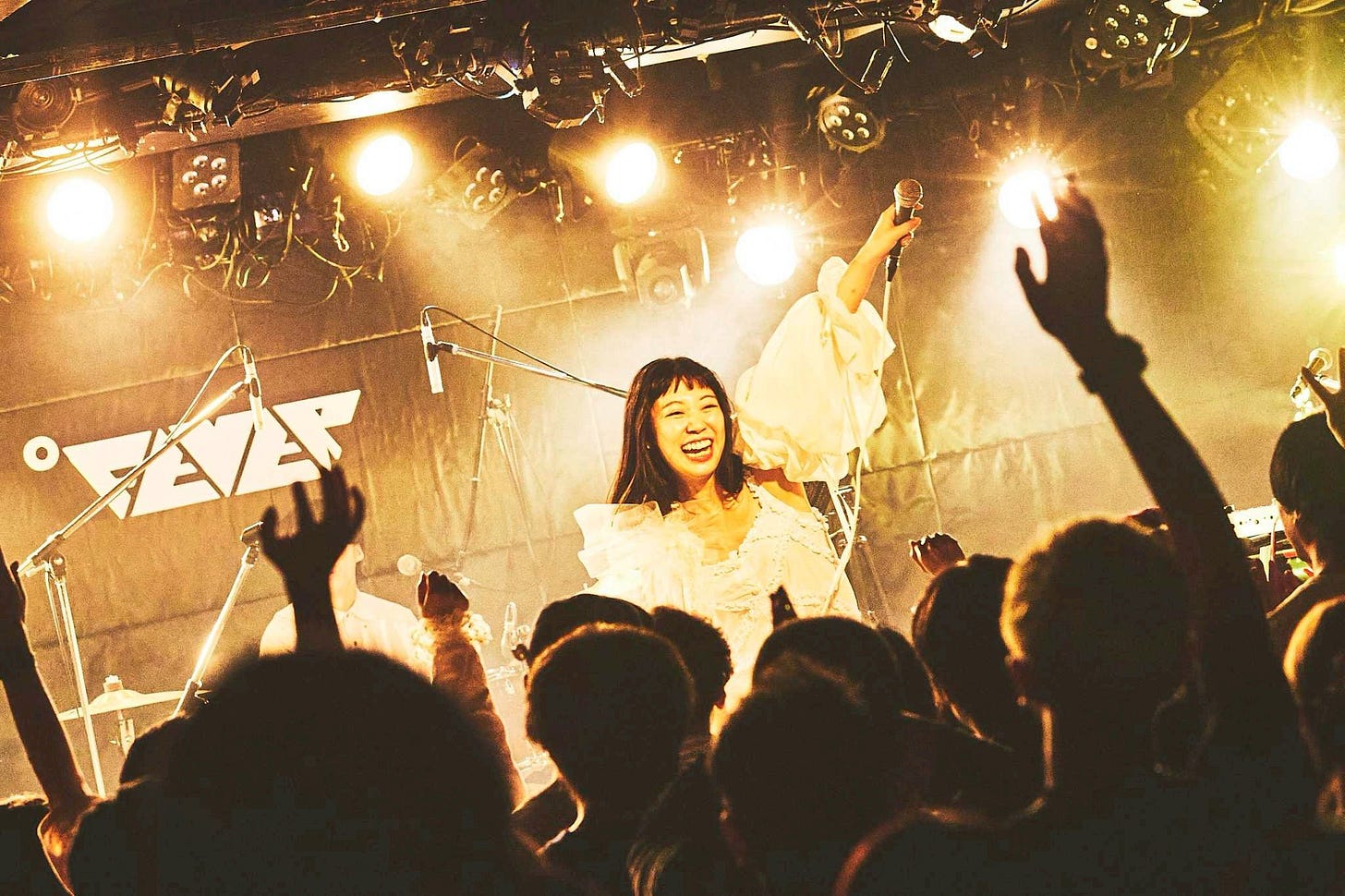
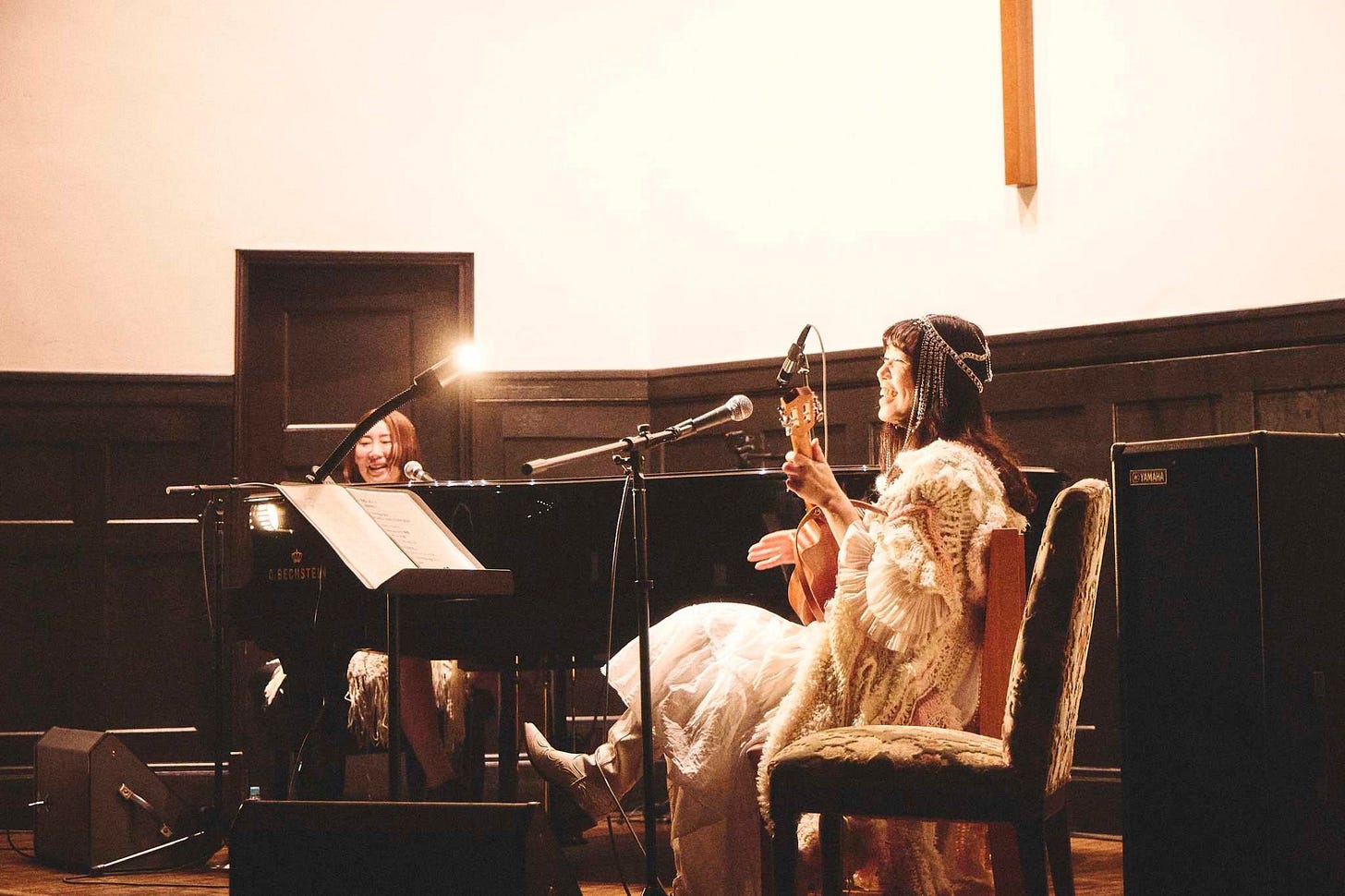
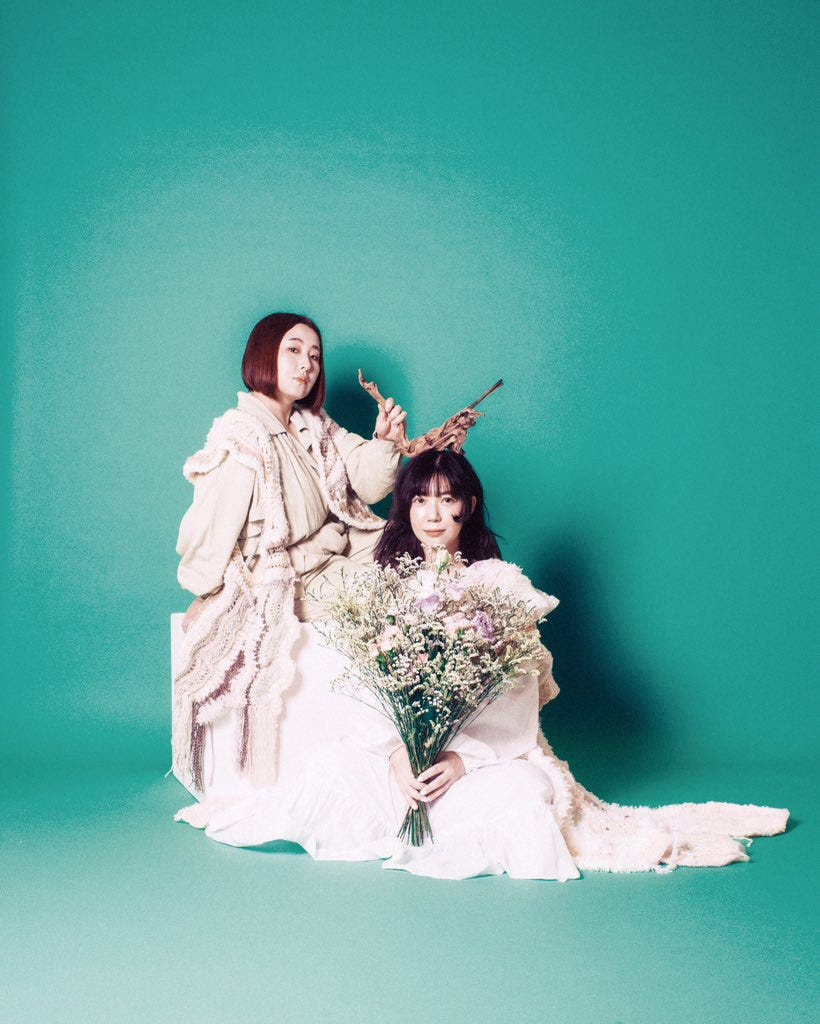
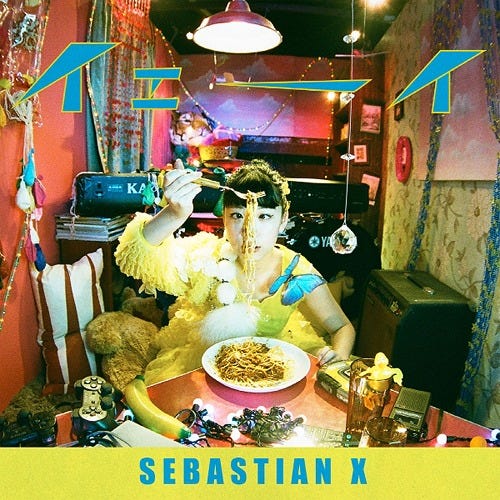
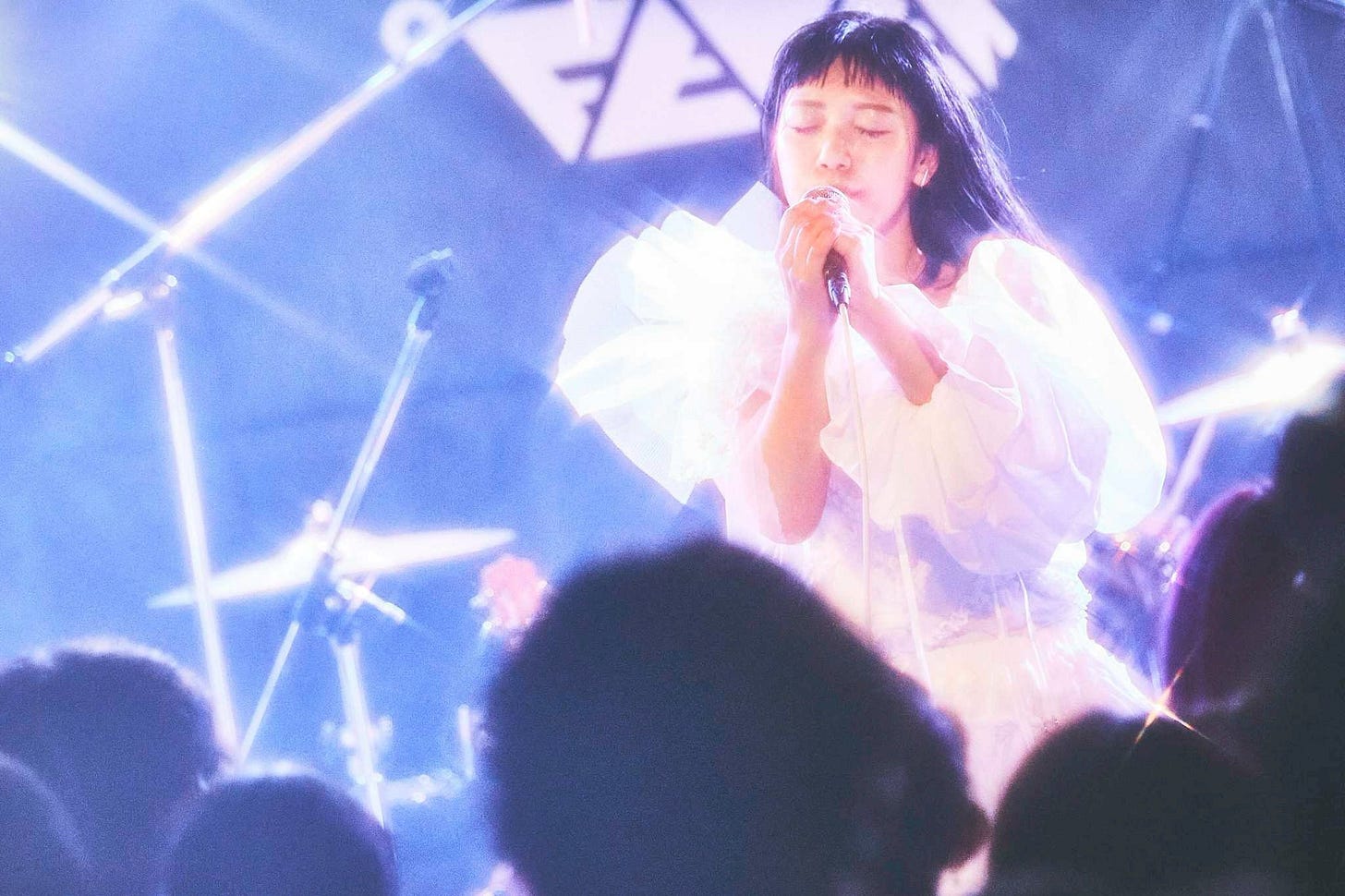
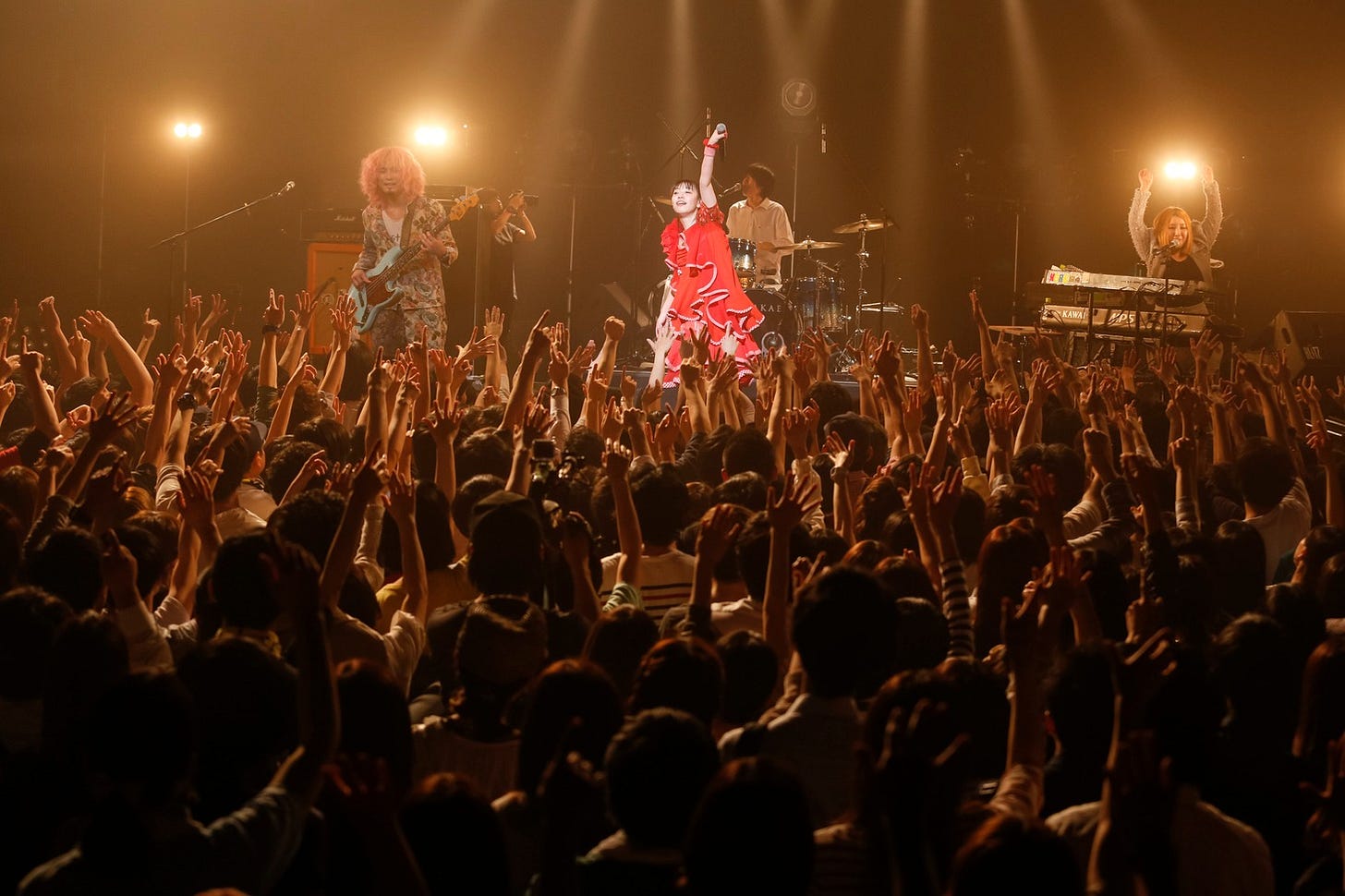
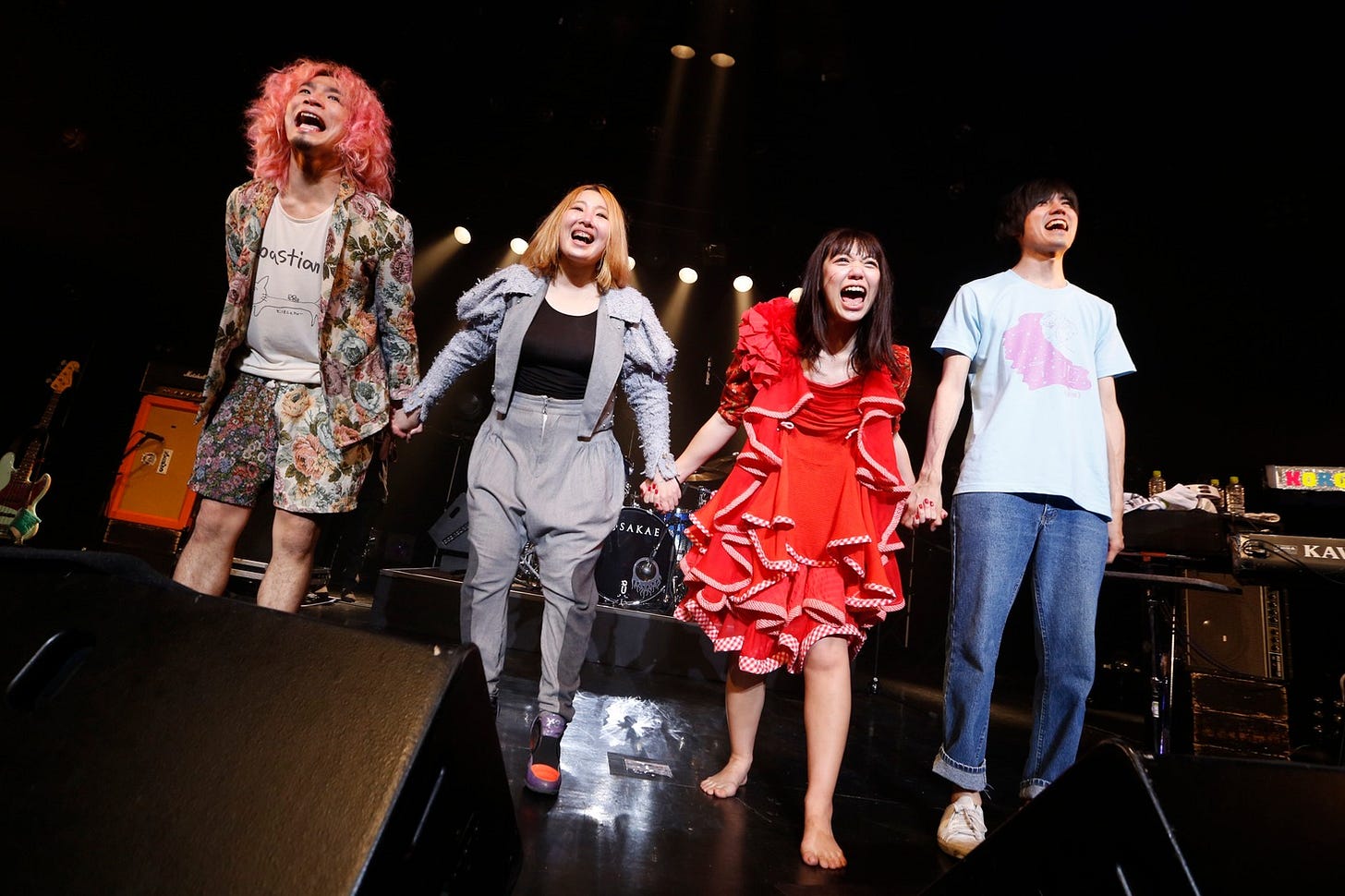
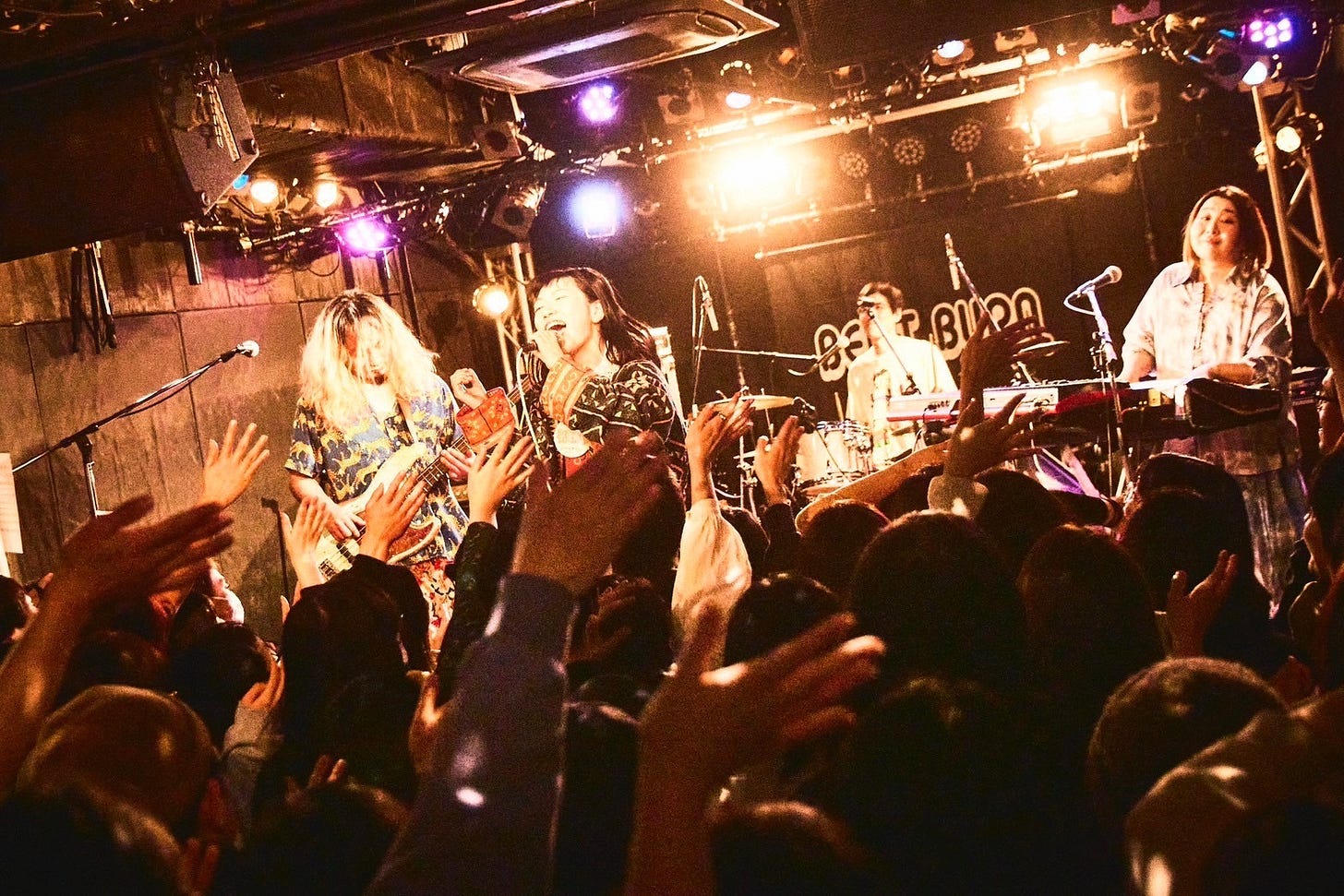
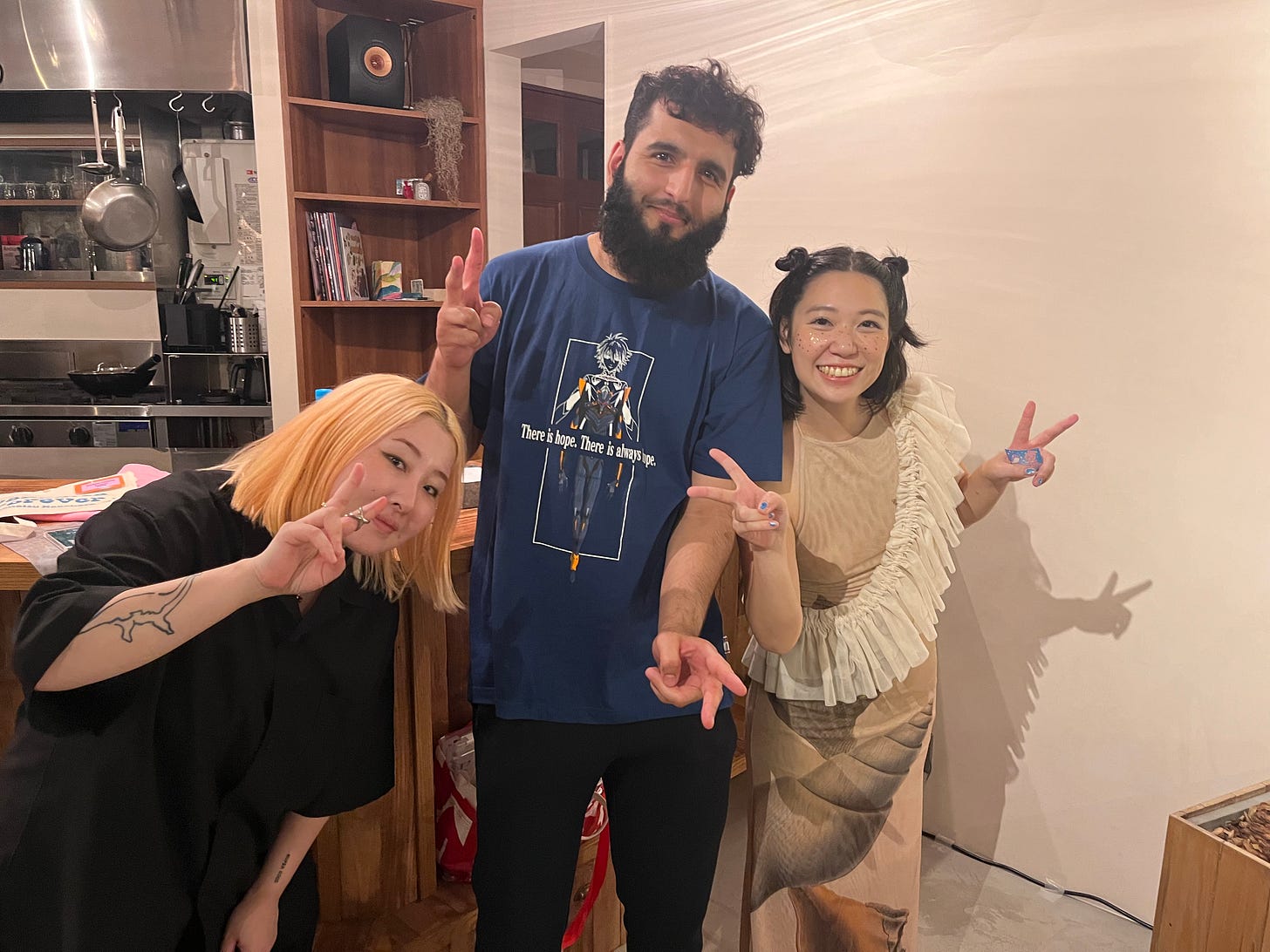
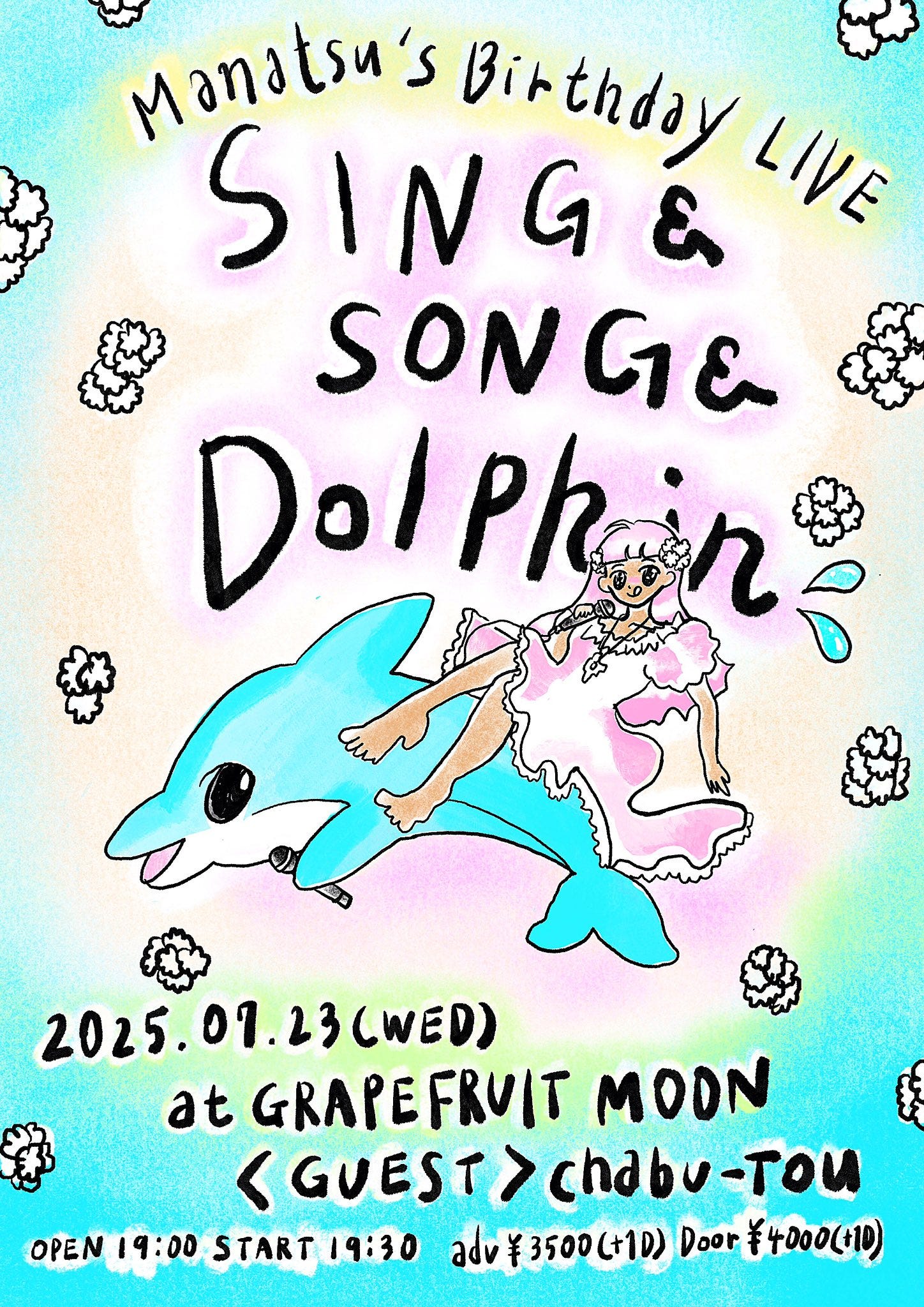
That was such a great read. Loved hearing about your connection to her music through her various projects. The story of how you ended up meeting her at what seemed to be quite an intimate show was lovely as well. That's so rad that she recognized you, those are memories to cherish now!
Looking forward to digging into the music too! I'm especially intrigued by Sebastian X as one of the songs embedded ("Yeah") slightly reminded me of Passepied. It seems to be giving a similar vibe as other Japanese acts I was big into in the mid 10s, so it's making me quite nostalgic!